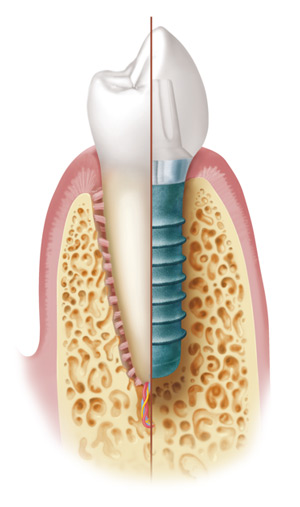Implant Dentistry

The loss of one or several teeth affects your ability to chew and your appearance. But that’s not all. Many people associate missing teeth with a negative physical identity, and psychological issues can be the result. One of our most important tasks is therefore to restore function and appearance as soon as possible after the loss of a tooth.
Today, dental implants are the most advanced – and often the only – way to provide a fixed prosthetic solution. Even if a bridge is theoretically possible, implants have the advantage that they do not require adjacent teeth to be ground down. In Germany, more than a million dental implants are fitted every year, and the trend is continuing upward. Dental implantology has seen great progress in terms of materials and techniques over the last 30 years, and is now one of the most important areas of modern dentistry.
With more than 1,000 implants annually, our practice is one of the biggest implantology centers in the region. Furthermore, we can draw on over 20 years of experience in the field of dental implants.
What exactly is a dental implant?
An implant is an artificial tooth root, usually made of titanium, which is set into your jaw during an operation. After a healing period, the implant can be used to hold crowns, bridges, or replacement teeth. The operation can usually be performed under local anesthetic. Sometimes, if the procedure is a lengthy one, analgo sedation is recommended or is requested by the patient. A general anesthetic is necessary only in extremely rare cases.
After the implants have healed (which takes between two and six months), abutments such as crowns, bridges, or dentures can be placed. This step is usually performed by your dentist. We have worked together with dental practices for many years to jointly plan implants, select implant systems, draw up cost estimates, and schedule treatment, and have developed standardized, well-functioning, and highly effective collaborations.
Our experience shows that, after treatment is complete, practically every patient is convinced of the personal benefit brought by dental implants. After the placement of crowns or bridges on implants, patients usually report that their replacement teeth look, feel, and function like natural teeth.
How long do dental implants last?
The durability of dental implants depends on a great number of factors (oral hygiene, general health, whether or not a patient smokes, and so on) over a very long period. It is therefore not possible to make a generally valid statement about how long implants last. But we can take a look at the statistics to get some indication. Large-scale studies show that, of 100 implants fitted, between 96 and 97 are still in place five years later.